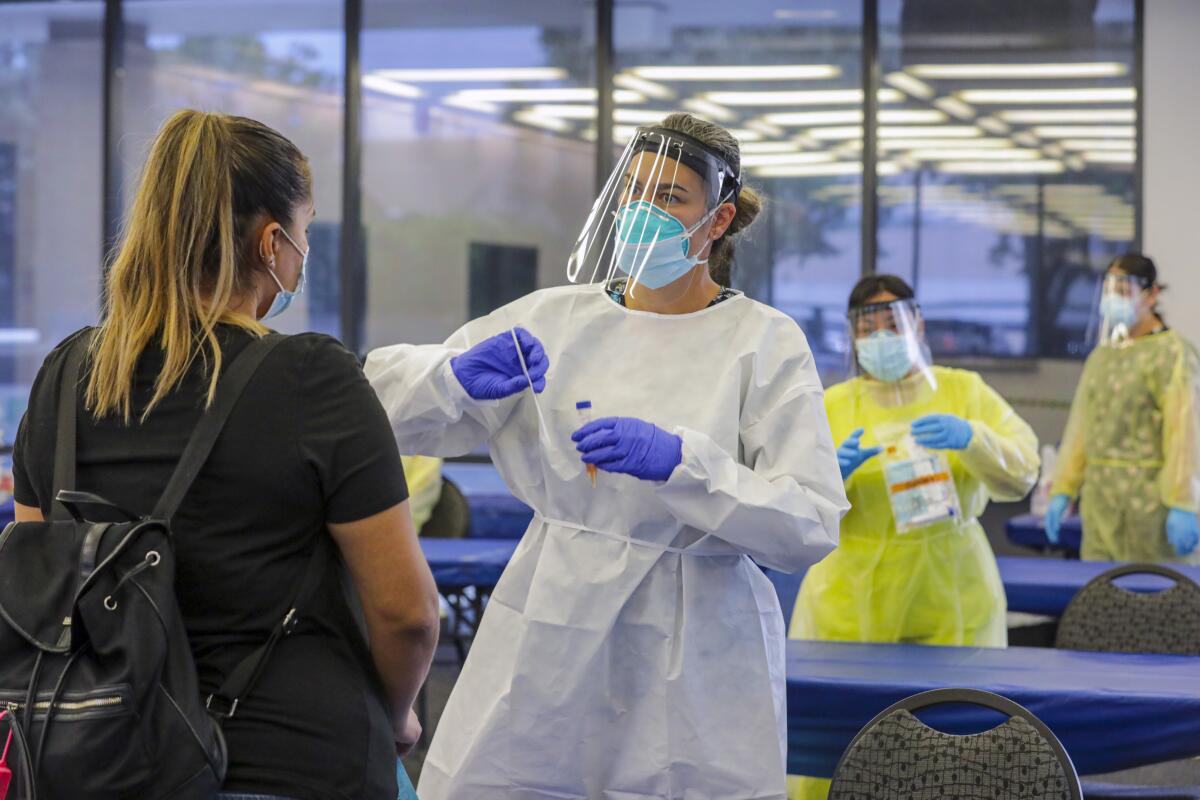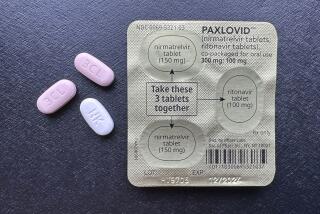How politics and muddled CDC messaging helped doom U.S. efforts to fight coronavirus

- Share via
Like most physicians, I considered March the starting line of a race, a race to learn as much as we could as quickly as we could about the novel coronavirus. The more we understood, I figured, the more lives would be saved.
But we lost the race, falling behind nearly every other country in whatever metric used to measure success in fighting this virus. With the Centers for Disease Control and Prevention now saying that its testing guidelines would exclude people who do not have COVID-19 symptoms, we can now say this as a country: We have not only lost the race because we failed to learn, we have quit trying to win.
Remember when Dr. Anthony Fauci and Dr. Deborah Birx would come to the podium each day during the coronavirus task force briefings and say the first key to controlling the virus was social distancing, which was effectuated by a sledgehammer approach that made people stay inside their homes. Masks? Not necessary. More widespread testing? Yes, we’re ramping up capacity. Contact tracing, which of course relies on an effective testing program? Yes, an important modality in limiting viral transmission.
The guidance regarding masks was walked back April 3, after nearly 280,000 COVID-19 cases in the U.S. had been confirmed. Contact tracing has largely been abandoned by public health departments — infrastructure does not exist and has not been developed to implement a comprehensive tracing program. Further, contact tracing has been hindered by poorly available testing — when it has been available, the results have taken too long to come back, making an effective contact tracing strategy impossible.
That makes the latest revision regarding testing by the CDC more perplexing, given that we now know that as many as half of those infected with the coronavirus are asymptomatic and can spread the virus. All this after the agency had previously said, “the potential for asymptomatic and pre-symptomatic transmission” was an important mode of transmission.
To my mind, there are three potential and concerning reasons for the change in direction, a reversal that seemingly squanders months of education about how the virus spreads.
First, lack of testing availability. An unnamed Health and Human Services spokesperson said last week in the New York Times, “Testing capacity has massively expanded, and we are not utilizing the full capacity that we have developed. We revised the guidance to reflect current evidence and the best public health interventions.” What current evidence and which best public health interventions? Countries that have had success fighting the virus share a common characteristic — a widely available testing program of symptomatic, pre-symptomatic and asymptomatic people, and a robust contact tracing capability. See Germany, Singapore, South Korea and others.
Second, a misinterpretation of what has and hasn’t worked could be driving the decision, a misunderstanding that reflects a failure to learn well and quickly about the pandemic. I can only hope this is not the case since the CDC underscores its name on the agency website with “CDC 24/7: Saving Lives, Protecting People.” At least the 24/7 part may be right.
Third, and the most difficult to accept, is that political motivation is behind limiting the number of tests performed in the country. President Trump has said that “if we stop testing right now, we’d have very few cases” and has even half-jokingly (I think) said, “I’ve said to my people, slow the testing down, please.”
This posture obviously reflects a poor understanding of how and why the virus continues to spread so freely in our country. With the latest backtrack on a fundamental tenet of our strategy to fight the virus, it makes one wonder how any scientist — at the CDC or elsewhere — could have thought the new position is scientifically defensible.
Consequently, the mind moves quickly toward wondering if this is some sort of twisted political maneuver to limit the detection of a virus that is out of control. However, I am reminded of Hanlon’s razor, a saying that is most often conveyed as: Never attribute to malice that which is adequately explained by stupidity.
I suppose which of these reasons — or combination of them — that best explain the reversal will remain unknown for now. Perhaps we will know only after in-depth investigative journalism or congressional hearings are conducted, which unfortunately will be well after more people die.
After widespread criticism of the revised CDC testing guidelines, Dr. Robert Redfield, director of the CDC, tried to walk back the recommendation, saying that “testing may be considered for all close contacts of confirmed or probable COVID-19 patients” and that “everyone who needs a COVID-19 test can get a test.” Confused? Me too. Such muddled communication is not helpful when clear and consistent messaging is needed to fight the virus.
Which brings me to my final point: the issue of trust.
Trust is a central component of delivering effective healthcare, not only between doctor and patient but also between the public and the healthcare institutions tasked with protecting us from known diseases and those that have newly emerged. The American public’s trust of its healthcare system, already frayed, has been further eroded by the government response to the coronavirus.
Our public health response — not the courageous efforts of our healthcare workers — can only be characterized as inept, lacking in preparedness, and one in which political considerations have overwhelmed whatever scientific consensus there may be. Crass manipulation and mischaracterization of what has been learned about the virus seems to have won the day, presumably for electoral gain.
The public’s trust will be hard to regain, and after all this, it should be.
Dr. David Weill is principal of the Weill Consulting Group and the author of the forthcoming memoir “Exhale: Hope, Healing and a Life in Transplant.”
More to Read
A cure for the common opinion
Get thought-provoking perspectives with our weekly newsletter.
You may occasionally receive promotional content from the Los Angeles Times.









